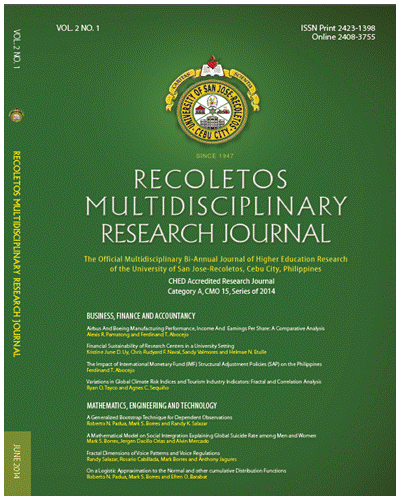The Impact of International Monetary Fund (IMF) Structural Adjustment Policies (SAP) on the Philippines
DOI:
https://doi.org/10.32871/rmrj1402.01.03Keywords:
Structural Adjustment Policies (SAPs), International Monetary Fund (IMF), economic growth and development, loan conditionalitiesAbstract
This paper investigated the impact of IMF structural adjustment policies (SAPs) on the Philippine economic performance. The study utilized critical analysis approach to evaluate secondary data from government statistics, the Bangko Sentral ng Pilipinas (BSP), World Bank, IMF and articles from online refereed journals. Analyses were focused on IMF prescribed SAP loan conditionalities pertaining to liberalization, export-oriented economic efficiency, privatization of estate owned assets, reducing government expenditures, and streamlining the bureaucracy. Findings revealed that trade liberalization implemented through stripping off restrictions of more than 900 items and reduction in nominal tariff protection fell short from the onset of global recession. Apparently, aggregate exports contracted instead of expanding while imports disproportionately increased when importers took advantage of the liberalized regime. This resulted to severe erosion of the Philippine industries which were left unable to compete in the open market. Government revenues, generated from the SAP driven privatization policy were redirected for debt servicing rather than being invested on productive programs and projects for economic development. This privatization policy even created local monopolies in the country’s capital market. Reduction in government expenditures through tightening of government budget, cuts in government subsidies and freezing the filling up of government vacant positions, failed to significantly impact on poverty alleviations and underpinned the much needed resources for basic health, education and social services delivery programs. In conclusion, the adherence by the Philippines to IMF loan conditionalities did not significantly benefit the country as manifested by the country’s sluggish economic development. The Philippines should never go back to the IMF loan portfolio, it should find other resources to propel growth and development away from IMF borrowing. Prudently however, it may continue to avail the Fund’s technical assistance program on monetary and international banking expertise without incurring external debt obligations from the Fund.
References
http://s3.amazonaws. com/zanran_storage/
www.afrodad.org/ContentPages/43088398.pdf
Arroyo, G. (2005). “State of the Nation Address (SONA) of President Gloria Macapagal-Arroyo’. Second Regular Session of the 13th Congress of the Republic of the Philippines. Manila. Philippines.
http://www.gov.ph/sona/sonatext2005.asp
Bello, W. (2006). ‘Unfinished Business: The Bretton Woods Twins and Southeast Asia.’, Focus on the Global South. Bangkok, Thailand. http://
www.focusweb.org/ publications/1997/Unfinished%20Business.htm
Bello, W. (2005). ‘The Tragedy of Contemporary Democracy in the South.’, Transcend, A Peace and Development Network. Romania. http://www.transcend.org/ t_database/articles.php?ida=574
Chung, D. (2006). ‘Bi-Annual Country Report: Philippines’, The World Bank. Washington D.C., USA. http://siteresources.worldbank.org/INTEAPHALF YEARLYUPDATE/ Resources/550192-1143237132157/philippines-March06.pdf
Fletcher, K. (2005). ‘Increasing Public Sector Revenue in the Philippines: Equity and Efficiency Considerations’, IMF Working Paper. Washington,
D.C. USA. http://www.imf.org/external/pubs/ft/ wp/2005/wp0522.pdf
IMF Country Report (2006). ‘Staff Report for the 2005 Article IV Consultation and Post-Program Monitoring Discussions. IMF Country Paper Report March 2006 – Philippines. Washington, D.C. USA. http://www.imf.org/external/pubs/ft/scr/2006/ cr0692.pdf
Lim, J., and Montes, M. (2001). ‘Structural Adjustment Program After Structural Adjustment Program, But Why Still No Development in the Philippines?’. MIT Press Journals. Massachusetts, USA. www.mitpressjournals.org/doi/abs/10.1162/153535102320894018
Orbeta, A. (1996). ‘Structural Adjustment and Poverty Alleviation in the Philippines’, Philippine Institute of Development Studies. Discussion Paper Series No. 96-04. Makati, Philippines. http://www3.pids.
gov.ph/ris/dps/pidsdps9604.pdf
Simbulan, N. (2002). ‘The Impact of Budget-Related Structural Adjustment on Education and Health-Care Services in the Philippines: A Summary Report’, Structural Adjustment Participatory Review International Network. SAPRIN Secretariat, Washington, DC, USA. http://www.saprin.org/philippines/research/ phi_services_sum.pdf
Downloads
Published
How to Cite
Issue
Section
License
Copyright of the Journal belongs to the University of San Jose-Recoletos


